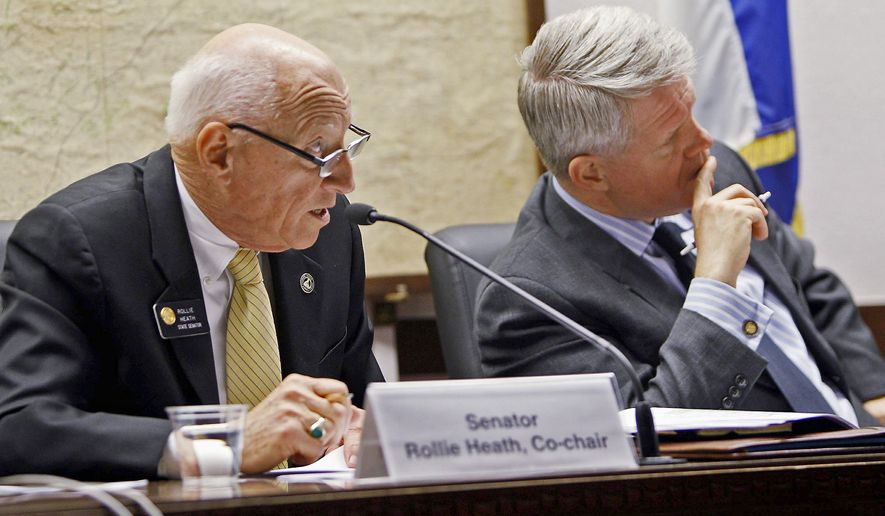DENVER — Any pol will tell you that there’s no good time to try to sell a tax increase to voters, and that a period of deep economic uncertainty is even worse — unless that pol is Colorado state Sen. Rollie Heath, who insists there’s no time like the present.
“The best way to grow yourself out of a recession is to invest in education,” the Democratic lawmaker said. “My dad said, ’The time to count paper clips is when you’re doing well; the time to spend money is when times are tough and other people aren’t.’ “
Mr. Heath, who apparently listened to his father, is the driving force behind Proposition 103, an against-the-grain measure slated for the November ballot that would raise an estimated $3 billion for education by implementing a temporary, five-year increase in the state sales and income taxes.
In an age of deep skepticism about state and federal spending, even Mr. Heath’s fellow Democrats here are less than enthusiastic about pushing a tax hike on the voters this year. Mr. Heath was forced to go the petition route to qualify the measure for the ballot after the Democrat-controlled Senate refused to approve the take hike as a referendum.
Gov. John Hickenlooper, a Democrat, remains officially neutral on the initiative, having promised during his 2010 campaign not to support a tax increase during his first year in office. The Colorado Education Association, the state’s largest teachers union, endorsed the measure only after the state secretary of state’s office verified the signatures in August.
“Other than the usual liberal groups and teachers unions, who came to this rather reluctantly, [Mr. Heath] doesn’t have much support,” Denver pollster Floyd Ciruli said. “The challenge he faces is that not only is the public really anxious about their own income limits and discretionary spending, but this is also an era of anti-government feeling. It’s just not a good time.”
Even so, the measure has attracted national attention as a gauge of anti-tax feeling. Of the 29 ballot measures now slated to appear on state ballots in November, Proposition 103 is the only true tax increase, according to Jennie Bowser, elections analyst for the National Conference of State Legislatures.
So far the public’s distaste for tax increases appears unchanged. A poll released Aug. 7 by Public Policy Polling showed 45 percent of Colorado voters are inclined to support the measure, while 47 percent are opposed.
And state Republicans have been quick to seize on the measure to accuse Democrats — once again — of favoring tax hikes to fund their pet government programs.
“Democrats dont get it,” said House Speaker Frank McNulty, a Republican from Highlands Ranch. “Colorados hardworking families and job creators are struggling to survive in this recession. The last thing they need right now is Democrats pushing another state tax increase.”
Still, the measure did garner 142,000 petition signatures, far more than the 86,000 required to qualify it for the ballot, an indication that voters still may have a soft spot for schools. Known as the “Bright Colorado Education Investment Initiative,” the proposal would raise the state income tax from 4.63 percent to 5 percent, and the state sales tax from 2.9 percent to 3 percent, from 2012 to 2017.
The measure states that the funding would be channeled to kindergarten through 12th grade and to higher education, although opponents say that nothing in Proposition 103 ensures that the money would be used for schools.
“With Proposition 103, the money goes into the general fund. There’s no guarantee the funds will be allocated to education,” said Regina Thomson, executive director of Too Taxing for Colorado, an issue committee formed to oppose the measure. “The money could just as easily go into [the Public Employees’ Retirement Association] to fund teachers’ retirement accounts.”
The opposition group also points out that about half of the state general fund already goes toward education. The school systems also benefit from Amendment 23, a 2000 initiative that requires the legislature to increase K-12 spending each year by the rate of inflation.
Despite that, Mr. Heath notes that Colorado still ranks in the bottom third in terms of state education funding. The state spends $8,718 per pupil, which ranks 38th nationally, according to 2009 figures from the Federal Education Budget Project.
The state is now embroiled in a school-funding lawsuit, Lobato v. Colorado, in which plaintiffs are seeking to force the state to lay out billions of dollars more for K-12 education. While the conventional wisdom is that the case could hurt Proposition 103, Mr. Heath said it might actually help by calling attention to “how dramatically underfunded we are.”
It’s tempting to dismiss Mr. Heath as another big-government Boulder Democrat — Mr. Ciruli calls him “the grandfather of Colorado liberals” — except that he also knows a thing or two about the private sector. Before running for office, Mr. Heath served as a senior executive with Armco Steel and Johns Manville, and later founded Ponderosa Industries, a metal-parts manufacturer.
Colorado won’t be able to lure companies and recharge its economy with a subpar public-education system, Mr. Heath said.
“If you don’t have an educated workforce, you’re not going to attract business,” he said. “I think it’s the best message we can send to the rest of the country, that we’re investing in education.”
• Valerie Richardson can be reached at vrichardson@washingtontimes.com.




Please read our comment policy before commenting.